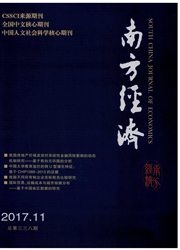

 中文摘要:
中文摘要:
分税制改革因导致中央和地方政府之间财权和事权的不匹配而增加了地方政府的财政压力,从而深刻地改变着地方政府的行为模式。当农业税费全归地方财政收入,农业对经济增长的贡献不断下降而经济增长又成为地方官员政治晋升的主要指标时,面临财政压力的理性地方政府会强化其城市偏向程度,从而损害农业增长。本文运用1978至2009年中国省级面板数据进行的实证分析表明:分税制下的地方财政压力对农业增长特别是粮食增长产生消极影响;非本级财政收入因缓解地方财政压力而有助于农业增长;地方政府对预算外资金的依赖则不利于农业增长。历史和经验证据支持了分税制改革强化地方政府城市偏向的观点。
 英文摘要:
英文摘要:
Tax sharing reform initiated from 1994 dramatically changed the fiscal relationship between the central and the local governments, and resulted in a pervasive fiscal pressure on the local governments as well as produced a distortion on local governments' behavior. This paper investigates how the tax sharing reform produces adverse effects on agricultural growth by strengthening local government' s urban bias. The empirical results given by China' s provincial panel data from 1978 to 2009 show that the fiscal pressure of local governments is indeed adverse to agricultural growth; non -budgetary incomes mainly from central government are good for agricultural growth while extra- budgetary incomes also undermine agricultural growth. Various evidences support that tax sharing reform strengthens urban bias at the local government level.
 同期刊论文项目
同期刊论文项目
 同项目期刊论文
同项目期刊论文
 期刊信息
期刊信息
